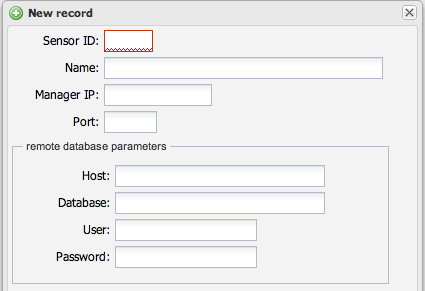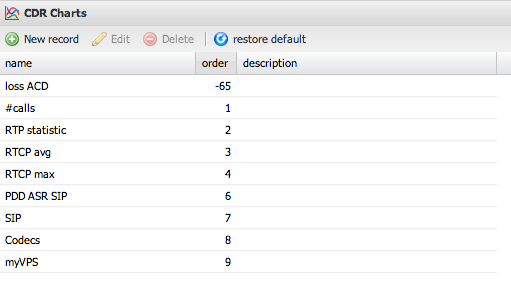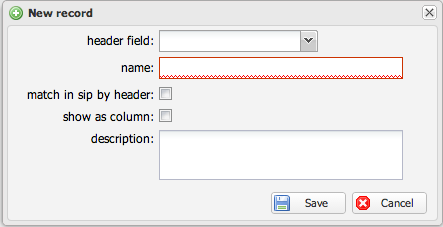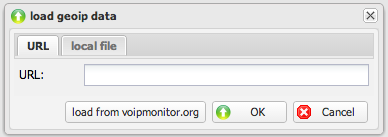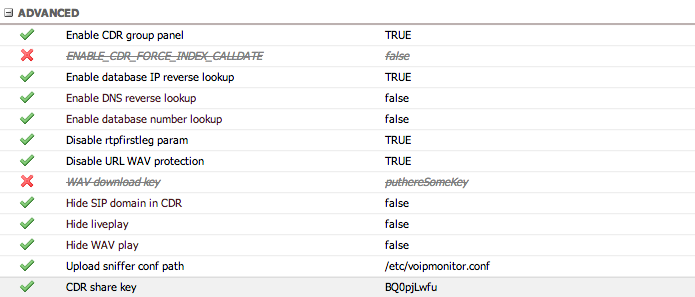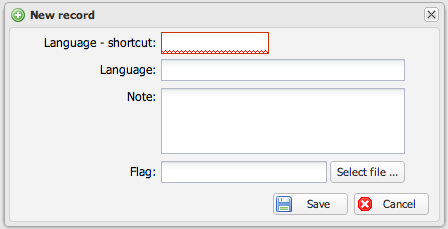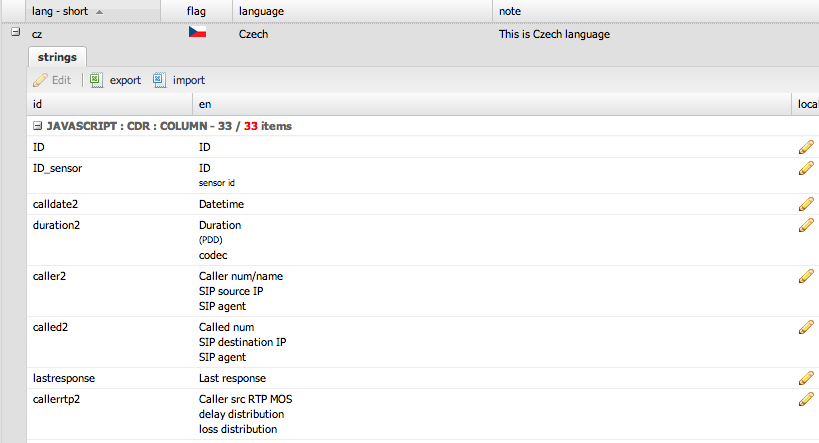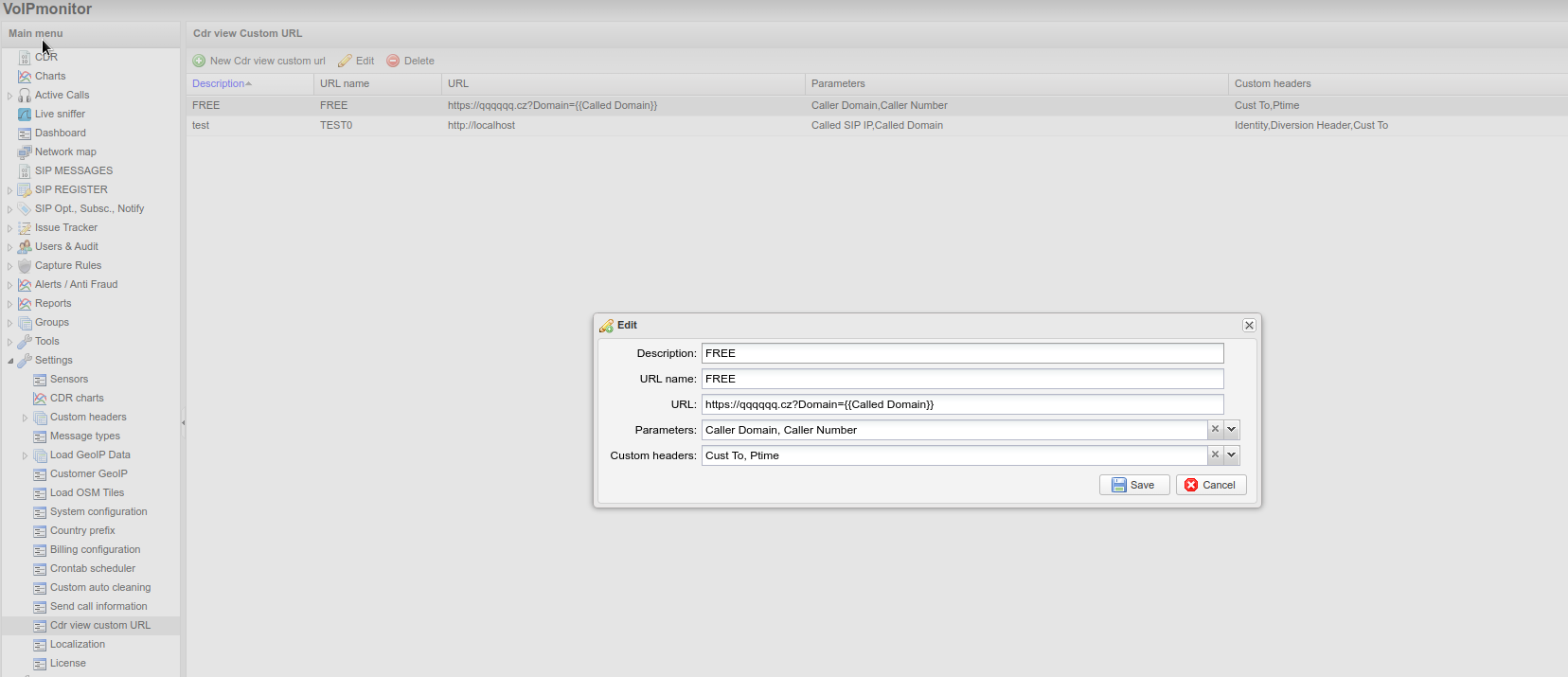Settings
Sensors
If id_sensor is set in /etc/voipmonitor.conf (default blank), create sensors here to download files like PCAP, graphs, WAV.
- Sensor ID: Number from /etc/voipmonitor.conf id_sensor = N
- Name: Sensor name
- Manager IP, Port: For fetching data (PCAP/graph files). Default port: 5029
- Remote database parameter: For finding legs in "Legs by [CID|header]" CDR tab if sensors use different databases. Leave blank if same database.
CDR Charts
Predefined charts for CDR detail charts section.
CDR Custom Headers
From sniffer version 7.0RC7, store custom SIP headers to database for viewing/searching: Sniffer_configuration#custom_headers.
Header Field
Combo box lists headers from cdr_next.custom_header*. Created automatically on custom_headers in voipmonitor.conf and restart.
Name
Header name in WEB GUI CDR header panel.
Match in SIP by Header
Use for matching CDRs in Call_Detail_Record_-_CDR#Legs_by_header. Example: Unique identifier in custom header for legs (phone to SBC, SBC to provider). Alternative: Sniffer_configuration#match_header.
Show as Column
Display header in CDR column.
Load GeoIP Data
Loads GeoIP data to internal database for CDR detail map.
System Configuration
Basic
- WEB URL: For hypertext links (e.g., email alerts)
- Sniffer data path: Directory to sniffer data (default: /var/spool/voipmonitor)
- Default sensor hostname: Default sniffer hostname (localhost). Define multiple in Settings > Sensors
- Default sensor TCP port: Default port (5029)
Database
Database settings.
National
- Timezone: Set to your Country/Town
- National prefix,2,3: Classify national/international calls (used in Active calls)
- Max national number length: Longer calls are international regardless of prefix
- Date format: Default Y-m-d[](http://www.php.net/manual/en/function.date.php)
- Time format: Default G:i:s[](http://www.php.net/manual/en/function.date.php)
- Week start
Intervals
- Default CDR interval: Filter interval on entering CDR section. If "specified number of days", set in next option
- Default CDR interval in days: Editable only if "specified number of days" selected
- Default dashboard interval: Filter interval on entering dashboard
- Default Legs by CID interval: Related calls +- interval (default: 5 seconds)
- Default Legs by header interval: Related calls +- interval (default: 5 seconds)
EMAIL HTTP REFERER
- DEFAULT_EMAIL_FROM: Default From header
- Disable email plain text: For mailers showing only plain text (e.g., Outlook 2003); enable to force HTML
GEOIP
- Use GEOIP local database: Enable/disable internal GEOIP (if loaded)
- GEOIP maxmind.com KEY: Personal key for maxmind.com
- GEOIP ipinfodb.com KEY: Personal key for ipinfodb.com
Advanced
- Enable CDR group panel: Enable/disable CDR bottom panel
- ENABLE_CDR_FORCE_INDEX_CALLDATE: Force calldate index on queries; for unoptimized MySQL. Enable only if needed.
- Enable database IP reverse lookup: Name IPs via internal IP lookup table
- Enable DNS reverse lookup: Name IPs via DNS
- Enable database number lookup: Name numbers via internal prefix lookup table
- Disable rtpfirstleg param: Disable --rtp-firstleg for PCAP audio decoding; only if needed
- Disable URL wav protection: Skip session check for WAV download; for external access. Secure with WAV key
- WAV download key: Key for WAV download without auth
- Hide SIP domain in CDR: Hide domains
- Hide live play: Hide in active calls
- Hide WAV play: Hide play buttons in CDR
- Upload sniffer conf path: Path to voipmonitor.conf for PCAP uploads
- CDR share key: String for unique hashes in CDR share URLs
Localization
Create national localizations for GUI (not 100% complete; report missing items).
Unlimited localizations; form to create:
Red numbers indicate untranslated items; useful post-upgrade.
Changes effective after logout/login.
CDR View Custom URL
Add custom link to CDR view (e.g., monitoring).
Setting
Set in GUI > Settings > Cdr view custom URL.
Add parameters/custom headers:
- Via Parameters and Custom headers items: Added as param1Name=value1
- Directly in URL as {{param1Name}}: Replaced with value
View
Links in Commands column of CDR view.
AI Summary for RAG
Summary: This article details VoIPmonitor GUI settings: sensors for file downloads, CDR charts/custom headers, GeoIP loading, system configs (basic, database, national, intervals, email, GEOIP, advanced), localization, and custom CDR URLs.
Keywords: GeoIP, system configuration, timezone, email, advanced settings, localization, custom URL
Key Questions:
- What are CDR custom headers and how to set them?
- How to load GeoIP data?
- What basic system configurations are available?
- How to set national prefixes and time formats?
- What interval settings control CDR and dashboard filters?
- How to configure GEOIP services?
- What advanced options like reverse lookups exist?
- How to create GUI localizations?
- How to add custom URLs to CDR views?
